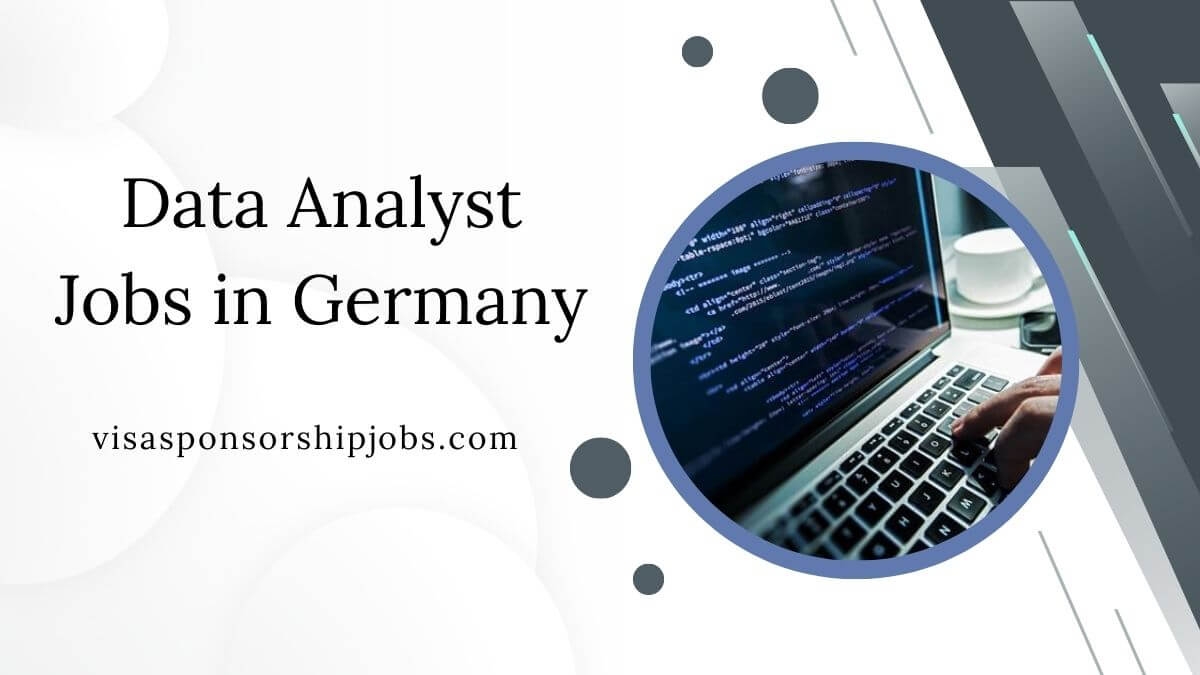One of the greatest options for anyone who must work abroad or are thinking about doing so is Germany. The country offers non-natives a variety of employment opportunities. The position of data analyst is the most frequently offered of these job vacancies. This is frequently the consequence of Germany’s steady growth in the research and IT sectors, which has increased opportunities in information science and analysis. Germany continues to rank among the top European countries in demand of information examiners. As a result, there may be a huge opportunity for many non-natives to immigrate to Germany each year in order to live and work there.
Additionally, according to data from the Bureau of Labor, jobs in science and information analysis have an exceptionally high growth rate in many countries, including Germany. Additionally, it was noted that advertising inquiries about investigators are expected to increase by 20%, mathematician/statistics by 33%, and operation questions about analyst posts are expected to increase by 25% between 2020 and 2013. Taking everything into account, I’m pretty sure you’re more interested in learning about the information examiner jobs in Germany that are sponsored by a visa.
You’re at the correct place, then. We’ll not so much offer you a job as an information investigator in Germany with a sponsored visa as we will teach you all you need to know about obtaining a sponsored visa to work as an information investigator in Germany.
Check More: Visa-Sponsored Hotel Jobs in Germany
Visa Sponsorship:
- In a country like Germany, many foreign workers seeking international employment are primarily concerned about visas or visa sponsorship. You can imagine how much easier it will be to discover a company that is ready and willing to handle your visa paperwork while still hiring you; it’s a great deal. So, to end your lengthy delay, let’s get right to the information you want regarding jobs that require a sponsored visa.
- Many IT firms in Germany have long promoted employer-sponsored visas, or visa sponsorship, especially when they are unable to locate the ideal applicant domestically. In any event, you should be aware that the employer or firm may not give your entire migration preparation much thought when it comes to sponsoring your visa. Many non-natives have purposefully miscalculated this.
- While you figure out the rest, some visa sponsorships may cover your visa. However, in certain situations, it may cover your visa, family documents (rare cases), airfare, your first few months’ housing, and even someone to help you with your paperwork while you’re there. It is unfair to refer to these few occasions as visa sponsorship; instead, it should be called a “relocation package.”
Data Analyst Jobs in Germany:
In Germany, there are several job opportunities for information investigators. In actuality, there are more personnel available for information examination than there are talented managers for information examination. For this reason, German employers and IT firms seek for foreigners with the skills. After earning a BSC or MSC, it should be easy to find a job in Germany as an information examiner for non-natives if you possess the necessary skill set. Various websites document specific details on investigator jobs in Germany that are sponsored by visas. The good news is that we have listed these websites in this post. The websites listed below allow you to apply for jobs as a data analyst in Germany with a sponsored visa.
Requirements:
- experience working in a similar field for more than two years;
- great foundation thanks to the variety of machine learning algorithms available;
- strong coding skills in at least one high-level programming language, such as Python, Scala, Clojure, etc.
- comprehensive knowledge of NoSQL and relational databases;
- proficiency with the massive information tools (Hadoop, Spark, etc.);
- high degree of proficiency in information representation (Seaborn, Bokeh, D3, etc.);
- skills in introduction and communication that are remarkable;
- Knowledge of extensive learning would be beneficial;
- It would be helpful to have a practical understanding of income administration.
Responsibilities:
You may undoubtedly increase your involvement and find a variety of opportunities for professional and personal growth if you start your Data Scientist career with us in Germany. The following duties are included in this full-time Data Scientist designer role with migration:
- Analyze data using our customer behavior models to determine the level of a request;
- Use factual models to find the answers to the actual showcase questions;
- Work with our business intelligence, income administration, and backend development teams to coordinate data-driven decision-making; show off your unique perspective and creative thinking while tackling challenging trade problems.
Benefits of Jobs:
- High Demand Across All Industries Ensures Job Stability: Germany’s data-driven economy continuously seeks skilled data analysts in sectors like finance, healthcare, automotive, tech, and logistics.
- Attractive Salary Packages with Annual Increments: Data analysts in Germany earn competitive salaries, often with performance bonuses, yearly raises, and profit-sharing options.
- Eligibility for Blue Card and Work Visa Sponsorship: Many companies sponsor international talent through Germany’s EU Blue Card or skilled worker visa programs, simplifying relocation.
- Access to World-Class Work Environments and Tech: Analysts use modern tools and platforms like Python, SQL, R, Tableau, and Power BI in highly professional and innovative settings.
- Opportunity to Work in English-Speaking Roles: Many data analyst positions in international firms and startups use English as the primary language, making it easier for foreigners.
- Fast Career Growth and Path to Senior Roles: With experience, data analysts can advance into positions such as Data Scientist, BI Analyst, or Analytics Manager.
- Work-Life Balance and Regulated Working Hours: German companies emphasize work-life balance, offering standard 35–40-hour workweeks, with paid overtime policies and breaks.
- Generous Paid Vacation and Public Holidays: Employees typically enjoy 20–30 days of annual paid leave plus 10+ public holidays, promoting rest and travel.
- Health Insurance and Social Security Benefits Included: All full-time employees receive comprehensive healthcare, pension contributions, unemployment insurance, and other state benefits.
- Affordable Living in Tech Hubs Outside Major Cities: While cities like Berlin and Munich are popular, many companies operate in affordable, high-quality living areas like Leipzig or Düsseldorf.
- Relocation Support and Integration Services Provided: Many companies assist with finding housing, handling bureaucracy, and offering relocation bonuses or moving allowances.
- Multicultural Workplaces with Diverse Teams: Germany’s tech and data sectors attract talent from around the world, fostering inclusive, global office cultures.
- Strong Legal Protections and Job Security: German labor laws protect employees’ rights, ensure job stability, and support workers during illness or personal emergencies.
- Access to Professional Development and Certifications: Employers encourage continuing education, offering training in tools like Python, data visualization, and statistical analysis.
Data Analyst Compensation in Germany:
In Germany, an information investigator typically makes £45000.00-556000.00 per year. This pay may differ based on your position, region of Germany, and other variables, according to Payscale.
Websites to Discover Data Analyst:
- Fasthire
- Indeed
- Relocate. me
- Glassdoor
- SimplyHired
- Relocateme.eu
Frequently Asked Questions:
What qualifications are required for data analyst jobs in Germany?
Typically, a bachelor’s or master’s degree in data science, statistics, computer science, or a related field is required, along with skills in SQL, Python, Excel, and data visualization tools (e.g., Power BI, Tableau).
Is English enough to work as a data analyst in Germany?
Indeed, many tech- and data-related roles in Germany, particularly in international companies or startups, offer opportunities in English. However, knowing German can be an advantage for broader job opportunities.
Are data analyst jobs in demand in Germany?
Yes, data analysts are in high demand across sectors like finance, healthcare, e-commerce, and logistics, with increasing opportunities for both local and international professionals.






